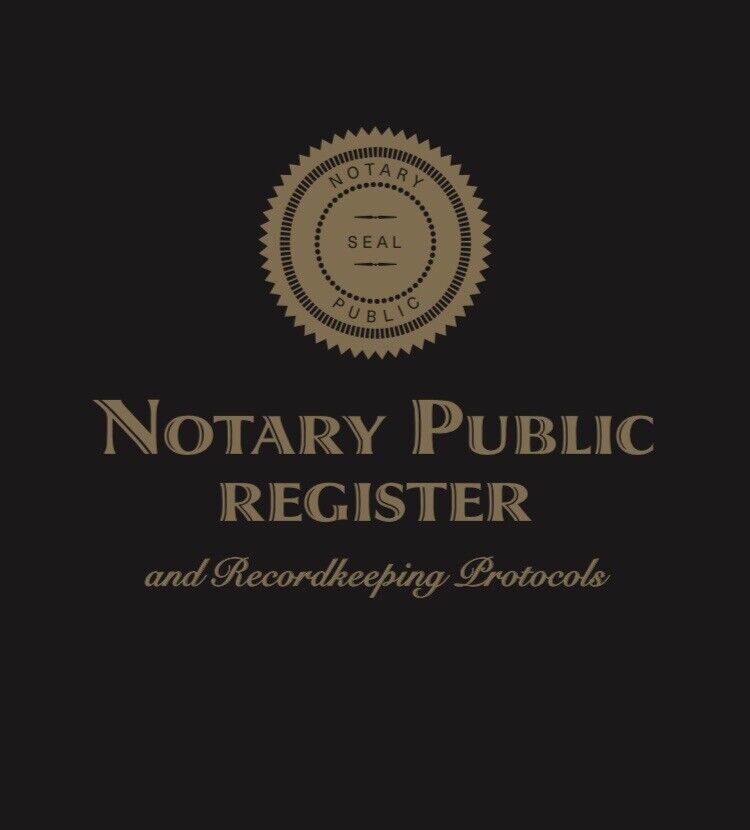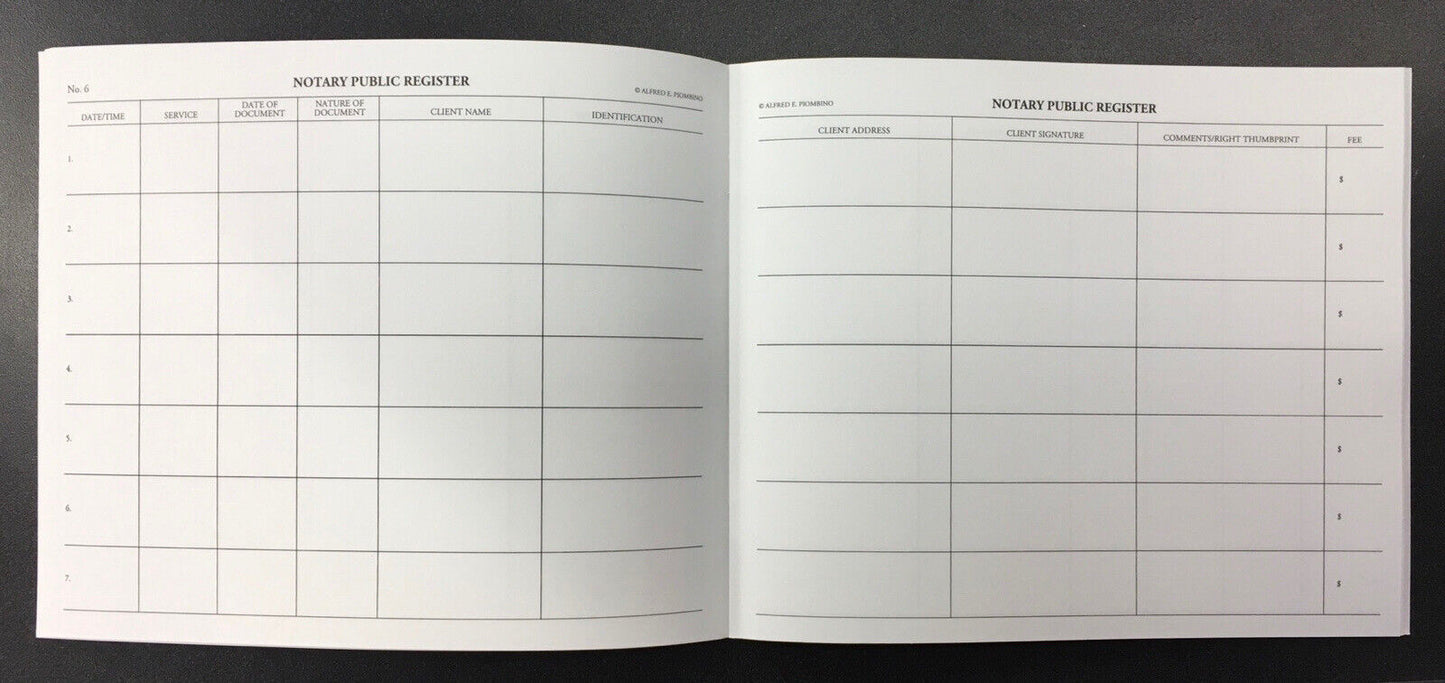Notary Public Register & Recordkeeping Protocols
Notary Public Register & Recordkeeping Protocols
Couldn't load pickup availability
View full details
Notary Public Register & Recordkeeping Protocols by Alfred E. Piombino
TITLE: Notary Public Register & Recordkeeping Protocols
AUTHOR: Alfred E. Piombino
Publisher: East Coast Publishing
ISBN 13: 978-3-944560-35-8
ISBN 10: 0-944560-35-0
PAGES: 64, 70# high-quality, ledger-type stock (saddle-stich binding)
WEIGHT: 10 oz.
SIZE: 8¼” x 10" (oblong-style)
PRICE: $14.95
ATTRIBUTES: Illustrated, Revised Edition
SUBJECT: Reference/Law
FORMAT: Quality Trade Paper (plastic-laminated cover)
Over 40 states either legally mandate or strongly recommend that a Notary Public maintain a Notary Public Register of all official activity.
There is no standard name for this type of
recordkeeping media and the terms Notarial Register, Notary Public Register,
Notary Log, Notary Journal, Notary Journal Book, Notary Diary, Notary Public Record, Notary Record Book and
Notary Public Record Book are synonymous.
Every year, Notaries Public who maintain a personal Notary Public Register successfully defend themselves from legal attacks and promote justice for innocent people.
Unlike a traditional public officer or employee, even though a Notary Public is indeed a state public officer in the eyes of the law, he or she is solely responsible to defend any legal challenges.
If he or
she is the target of a criminal indictment, civil lawsuit, or even a government
disciplinary action, the Notary Public is left alone to defend the charge –
even if becoming a Notary Public is a job requirement of a private or public
employment.
While the government has overall statutory authority to
issue, suspend and/or revoke a Notary Public commission, in addition to levying
an administrative fine, it never suffers from a guilty verdict levied upon a
Notary Public – the Notary Public alone bears all financial loss, employment
jeopardy and possible life-long, public humiliation – plus countless collateral
consequences.
Here are four more good reasons to maintain a Notary Public Register:
1. Even a trained, experienced Notary can make an honest mistake.
Upon realizing a mistake was made, a Notary Public Register recording makes contact possible to permit the Notary to alert the client and remedy the mistake, if possible. Recording basic notarial act data could help to avoid unnecessary legal costs, disciplinary action (including suspension or removal from office) by the government and even a costly damages judgment or settlement for negligence – not to mention lost professional credibility in the eyes of the client, employer and community.
2. People deny they ever appeared before a Notary (even when they actually did appear).
This scenario puts the Notary on the defensive. Capturing an original signature, an identification serial number – even a thumbprint impression – plus other notarial act-related information, will help bolster the credibility of the Notary in the eyes of the law. It might even help ward off a possible legal action before it ever gets off the ground. How else can a Notary positively prove that someone personally appeared before him or her and that proper identification was requested and examined at that time?
3. Forgery of notarial
(and judicial) signatures is increasing.
A Notary can’t prevent an unscrupulous person from forging his or her official signature. It can easily occur by a dishonest person tracing a Notary’s signature from a legitimate, notarized signature document onto a bogus, forged document. A Notary can defend the charge and challenge this serious felony by showing a Notary Public Register (with no entry record of this bogus notarial act) to the governmental authorities or the court. A Notary who simply declares, at a deposition or on a court witness stand, that “it wasn’t his or her signature”, may not be sufficiently convincing that the signature was truly a fake.
4. Notaries are
summoned to testify before court judges, government hearing officers and
attorneys at depositions.
The rules of evidence for testimony take many factors into
account, including written records. A
professional and properly maintained Notary Public Register, along with a thorough
understanding of notarial principles and practices, will go a long way to
building Notary-witness credibility in the eyes of a judge, jury or hearing
officer. By having a register ready for
memory refreshing before and even during sworn testimony, the Notary-witness
now becomes a more reliable witness.
Thus, his or her testimony becomes more valuable as evidence. If you were served with a judicial subpoena,
could you conscientiously testify and provide a true, detailed-filled account
of a notarial act that took place several years ago?
In conclusion, every professional Notary Public in the United
States should keep records of every notarial act in a Notary Public Register.
Additional book titles by Author Alfred E. Piombino:
* Notary Public Handbook: Principles, Practices & Cases, National Edition,
ISBN10: 0-944560-69-5, ISBN13: 978-0-944560-69-3
* Notary Public Handbook: A Guide for New York, Fourth Edition,
ISBN10: 0-944560-50-4; ISBN13: 978-0-944560-50-1
* Notary Public Handbook: A Guide for New Jersey,
ISBN10: 0-944560-26-1; ISBN13: 978-0-944560-29-7
* Notary Public Handbook: A Guide for Florida,
ISBN10: 0-944560-33-4, ISBN13: 978-0-944560-33-4
* Notary Public Handbook: A Guide for Maine,
ISBN10: 0-944560-32-6, ISBN13: 978-0-944560-32-7
* Notary Public Handbook: A Guide for Vermont Notaries, Commissioners & Justices of the Peace,
ISBN10: 0-944560-97-0, ISBN13: 978-0-944560-97-6
* Notary Public Register & Recordkeeping Protocols,
ISBN10: 0-944560-35-0, ISBN13: 978-0-944560-35-8
Alabama Notary, Alaska Notary, Arizona Notary, Arkansas Notary, California Notary, Colorado Notary, Connecticut Notary, Delaware Notary, Florida Notary, Georgia Notary, Hawaii Notary, Idaho Notary, Illinois Notary, Indiana Notary, Iowa Notary, Kansas Notary, Kentucky Notary, Louisiana Notary, Maine Notary, Maryland Notary, Massachusetts Notary, Michigan Notary, Minnesota Notary, Mississippi Notary, Missouri Notary, Montana Notary, Nebraska Notary, Nevada Notary, New Hampshire Notary, New Jersey Notary, New Mexico Notary, New York Notary, North Carolina Notary, North Dakota Notary, Ohio Notary, Oklahoma Notary, Oregon Notary, Pennsylvania Notary, Rhode Island Notary, South Carolina Notary, South Dakota Notary, Tennessee Notary, Texas Notary, Utah Notary, Vermont Notary, Virginia Notary, Washington Notary, West Virginia Notary, Wisconsin Notary, Wyoming Notary, District of Columbia Notary, Puerto Rico Notary, Guam Notary, U.S. Virgin Islands Notary, American Somoa Notary, Northern Mariana Islands Notary
Recognized as the “Dean” of American Notaries, independent scholar Honorable Alfred E. Piombino is a notary law, practice and ethics authority. Since 1987, as a speaker on the national lecture circuit, Piombino’s dynamic style and rare humor place him behind lecterns addressing scores of prestigious groups including National Association of Secretaries of State, International Institute of Municipal Clerks, International Association of Clerks, Recorders, Election Officials and Treasurers, American Institute of Banking and Center for Financial Training.
Piombino is a prolific teacher and writer, litigation consultant and is listed in Who’s Who in American Law. His encyclopedic knowledge of American Notarial Law and Practice is the result of thirty-five plus years of intensive research. He has written and published seven law books, including Notary Public Handbook: A Guide for New York. When notarial-legal issues arise, he is a sought-after analyst and commentator by attorneys and the news media including The New York Times, The Wall Street Journal and USA Today.
His public service dossier includes government duty in numerous professional, public administration posts including Fair Hearing Officer and Civil Service Commissioner for the City of Portland, Maine. He held the state constitutional office of Register of Probate for the County of Cumberland, Maine, serving the Probate Court and Registry of Probate. He holds a lifetime term as a Maine State Dedimus Justice. He is a past member of the National Center for State Courts.
He is a member of the American Bar Association (Science & Technology Law Section) Information Security and E-Filing Committees and a contributor to the original American Bar Association Model Digital Signature Guidelines concerning electronic signatures, digital notarial acts, and encryption for legal documents. He is a Life Member and past Director of the American Society of Notaries and a National Notary Association member.
Mr. Piombino received his Bachelor of Science Degree in Business Administration-Finance/Psychology and Master of Public Administration Degree from Marist College in New York. He is a Harvard Law School-trained mediator and is past State University of New York college business law faculty.
He was born in the Hudson River Valley Region of New York, near Hyde Park in Dutchess County.



